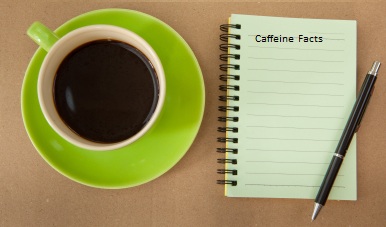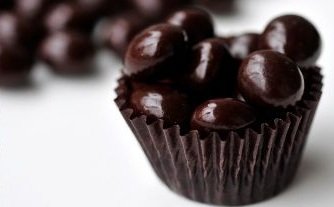Caffeine Facts

Caffeine Facts
If someone asked you what the most commonly used mind-altering drug is, what would you say?
The answer to this question is caffeine--the caffeine that is consumed every day in coffee, teas, soft drinks, cocoa, chocolate, cold remedies, pain relievers, weight loss products and diuretics.
It has long been a controversial topic and experts cannot seem to agree whether it is good or bad for you.
Here are some caffeine facts that may help you decide for yourself.
Generally speaking…
-Caffeine is a stimulant that increases alertness and masks fatigue. (This means that it does not actually give you more energy, it just makes you think you are no longer tired!)
-Caffeine comes from several plant sources including tea leaves, coffee beans, guarana, kola nuts and cocoa beans (chocolate).
-Caffeine is a vaso-restrictor (makes veins smaller), so it can help alleviate headache pain that is due to dilated veins.
-The US RDA who is responsible for keeping our food supply safe, lists caffeine as a substance that is generally recognized as safe (GRAS).
-The level of caffeine in tea depends on the type of tea, where the tea was grown, the time of year the tea leaves were picked among other factors.
-Most of the caffeine in cola comes from additives derived from coffee, although kola nuts have some caffeine in them naturally.
-Guarana (pronounced gwa-ra-NAH) is one of the richest sources of caffeine, with up to three times the amount of caffeine that is found in coffee.
Interesting note: Not everyone metabolizes caffeine at the same rate. Genetics plays in role in how your body handles caffeine, so it may stay in your system longer or affect you differently than others.
Who consumes it…
-At last count, 80-90 percent of adults and children in North America consume at least some caffeine daily.
-Caffeine is the most widely used psychoactive (affects mind or mental processes) drug in the world.
-The intensity of response to caffeine varies greatly with different people.
-Not everyone metabolizes caffeine at the same rate, so that caffeine may affect people differently with regard to blood pressure, insomnia and other side effects.
Side effects…
-Caffeine may act as a mild diuretic, causing you to lose water.
-Possible side effects of consuming caffeine include irritability, headache, upset stomach, insomnia, nervousness and diarrhea.
-Regular caffeine intake may lead to chronic fatigue.
-Caffeine may cause anxiety as well as depression because of the way it alters brain chemistry.
-Caffeine can be addictive.
-Too much caffeine may upset bowel rhythm, causing irregularity.
-It takes approximately 3 cups of water to compensate for the dehydrating effects of caffeine.

Who should NOT consume caffeine?
-In some women, caffeine can aggravate fibrocystic breast disease (a harmless but annoying condition where the breasts get lumpy).
-Caffeine should be avoided if you have ulcers.
-Some people are so sensitive to the effects of caffeine, they must avoid it altogether.
-Caffeine may increase craving for alcohol in alcoholics.
-Patients with Irritable Bowel Syndrome (IBS) are often advised to avoid caffeine.
-Researchers have found that consuming five or more cups of coffee per day doubles the risk of miscarriage.
-Breast feeding mothers should limit their intake of caffeine since it will pass through their milk to the baby.
-If you get migraine headaches, have Crohn’s disease, hiatal hernia or osteopenia, you may have to eliminate caffeine from you diet.
-If you suffer from acid reflux you may need to avoid caffeine.
Benefits
-Both coffee and tea, two of the main sources of caffeine in the diet are loaded with antioxidants.
-Recent studies had suggested that caffeine may help deter mental decline in dementia and Alzheimer’s Disease patients or even make you less likely to develop them.
-Caffeine may help clear brain fog and enhance mood.
Important Caffeine Fact: A pharmacological dose of caffeine has been established as 200 mg.
How much caffeine is in the products we use?*
-An 8 oz. cup of brewed coffee has about 95 mg of caffeine.
-An 8 oz. cup of green tea has about 30 mg of caffeine.
-A 12 oz. serving of cola has about 30-32 mg of caffeine.
-A 12 oz. serving of Mountain Dew soft drink has about 45 mg of caffeine.
-An 8 oz. cup of black tea has about 47 mg of caffeine.
-A 12 oz. glass of iced tea has about 10 mg of caffeine, depending on how diluted it is.
-A 16 oz. bottle of Snapple tea (all flavors) has about 42 mg of caffeine.
-A 12 oz. serving of Barq’s root beer has about 18 mg of caffeine.
The darker the chocolate, the less sugar and the more caffeine it contains.

Dark chocolate covered coffee beans have about 235 mg of caffeine per 1 oz. serving.
Coffee-flavored yogurt can have 45 mg of caffeine per cup.
Cold remedies often contain about 30 mg of caffeine per tablet.
Diuretic tablets may contain 100 mg of caffeine each.
Pain relievers may contain anywhere from 30-65 mg of caffeine.
Drugs that are taken to keep you awake may contain anywhere from 100-200 mg of caffeine per tablet.
Some weight control aids may contain 200 mg of caffeine per tablet.
Herbal teas generally do not have caffeine in them. Check the package to be sure.
For information on the caffeine in energy drinks, please click on this link.
*Keep in mind that the amounts listed are approximate and may vary somewhat based on changes in recipe and how product is processed.
The bottom line for caffeine facts
So far, there is not much evidence that moderate use of caffeine is unhealthy. However, as mentioned above, people with certain conditions should limit or avoid it, especially if you seem to be more sensitive to its side effects.
Caveat for Caffeine Facts: If you habitually use caffeine to override your body's need to sleep, you will pay a price in the long run. Your physical and mental health will suffer if you constantly thwart your body's built-in warning signals.
My advice is that caffeine-containing beverages should be used only in moderation , in the form of coffee or tea, but not as a replacement for water consumption. Soft drinks and energy drinks that are loaded with sugar, artificial sweeteners and other chemicals have no real place in a healthy diet.
I hope these caffeine facts will help you make good choices for your health.

